University Nursing: Episode of Patient Care Reflection
VerifiedAdded on 2022/08/25
|12
|3166
|305
Journal and Reflective Writing
AI Summary
This reflective paper from a nursing student details an episode of patient care involving a 60-year-old man admitted with suicidal ideation and depression. The student recounts conducting a holistic needs assessment (HNA) under supervision, highlighting initial confusion and interruption due to a lack of introductory communication with the patient. The paper explores feelings, evaluations, and analysis of the experience, emphasizing the importance of therapeutic communication, holistic nursing practice, and obtaining informed consent. It discusses the benefits of HNA, including improved patient communication, psychological well-being, and error prevention, while also addressing the ethical implications of patient autonomy and the need for respect and dignity. The conclusion outlines an action plan for future practice, focusing on adhering to NMC standards regarding patient communication, holistic assessment, and informed consent to enhance patient care and outcomes.
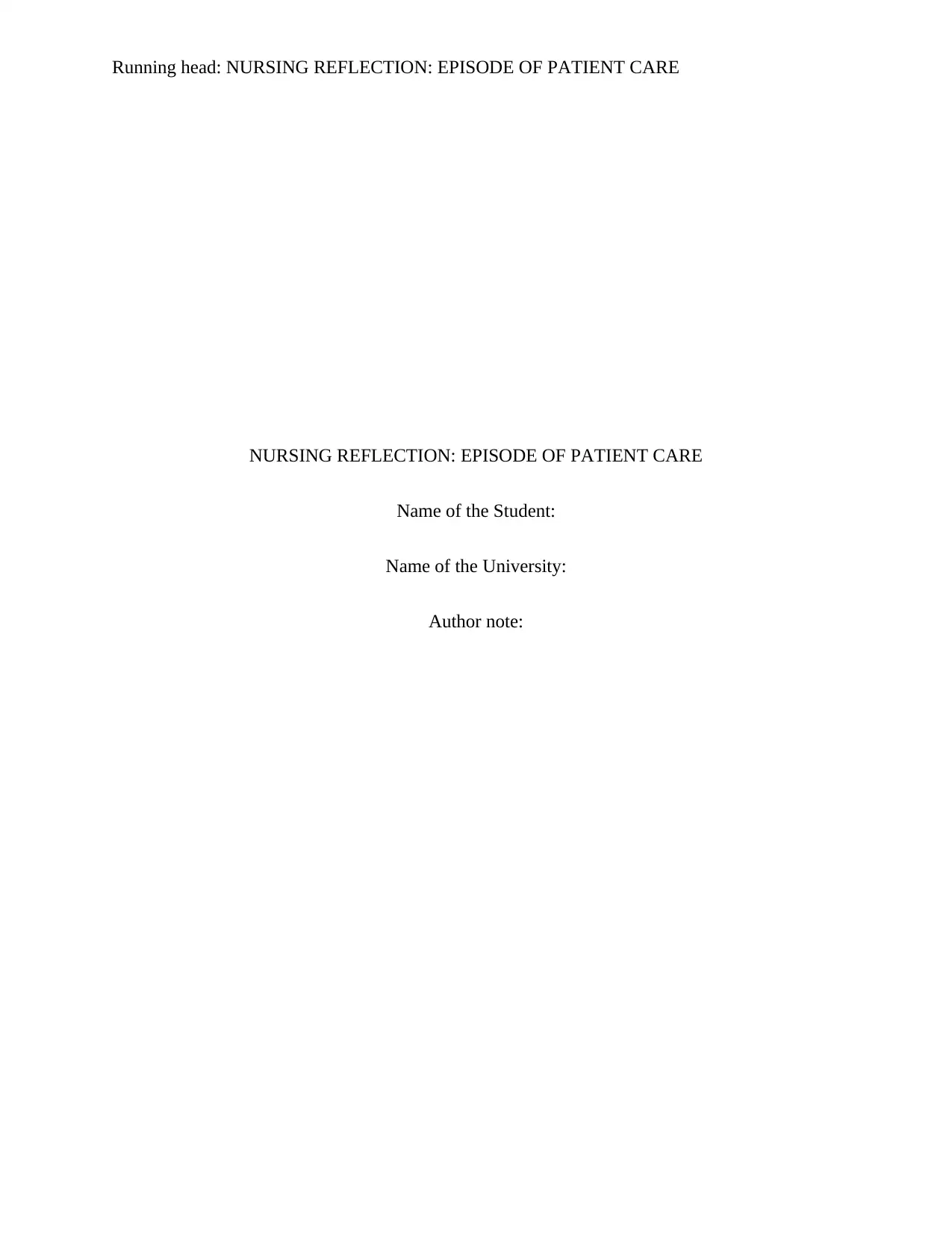
Running head: NURSING REFLECTION: EPISODE OF PATIENT CARE
NURSING REFLECTION: EPISODE OF PATIENT CARE
Name of the Student:
Name of the University:
Author note:
NURSING REFLECTION: EPISODE OF PATIENT CARE
Name of the Student:
Name of the University:
Author note:
Paraphrase This Document
Need a fresh take? Get an instant paraphrase of this document with our AI Paraphraser
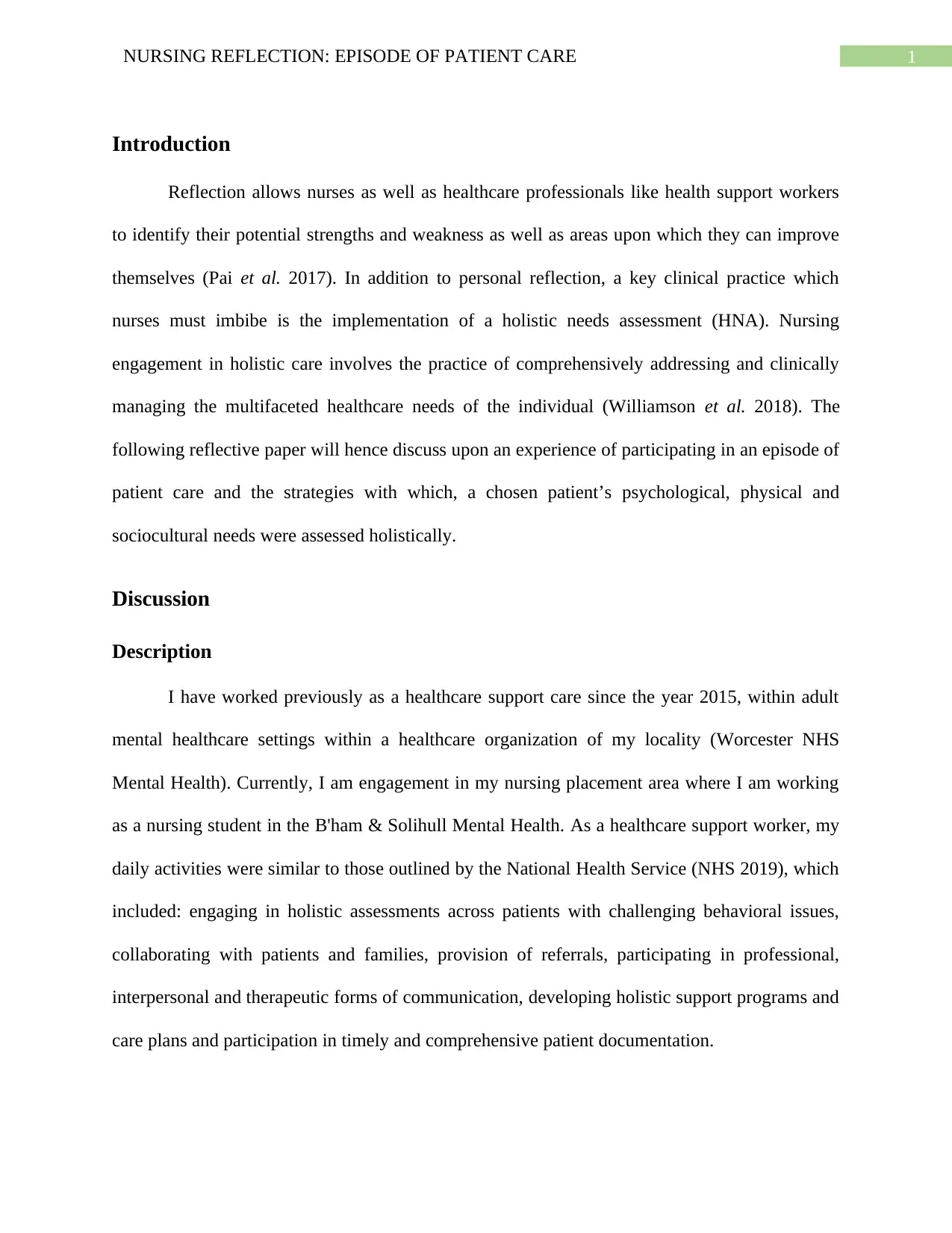
1NURSING REFLECTION: EPISODE OF PATIENT CARE
Introduction
Reflection allows nurses as well as healthcare professionals like health support workers
to identify their potential strengths and weakness as well as areas upon which they can improve
themselves (Pai et al. 2017). In addition to personal reflection, a key clinical practice which
nurses must imbibe is the implementation of a holistic needs assessment (HNA). Nursing
engagement in holistic care involves the practice of comprehensively addressing and clinically
managing the multifaceted healthcare needs of the individual (Williamson et al. 2018). The
following reflective paper will hence discuss upon an experience of participating in an episode of
patient care and the strategies with which, a chosen patient’s psychological, physical and
sociocultural needs were assessed holistically.
Discussion
Description
I have worked previously as a healthcare support care since the year 2015, within adult
mental healthcare settings within a healthcare organization of my locality (Worcester NHS
Mental Health). Currently, I am engagement in my nursing placement area where I am working
as a nursing student in the B'ham & Solihull Mental Health. As a healthcare support worker, my
daily activities were similar to those outlined by the National Health Service (NHS 2019), which
included: engaging in holistic assessments across patients with challenging behavioral issues,
collaborating with patients and families, provision of referrals, participating in professional,
interpersonal and therapeutic forms of communication, developing holistic support programs and
care plans and participation in timely and comprehensive patient documentation.
Introduction
Reflection allows nurses as well as healthcare professionals like health support workers
to identify their potential strengths and weakness as well as areas upon which they can improve
themselves (Pai et al. 2017). In addition to personal reflection, a key clinical practice which
nurses must imbibe is the implementation of a holistic needs assessment (HNA). Nursing
engagement in holistic care involves the practice of comprehensively addressing and clinically
managing the multifaceted healthcare needs of the individual (Williamson et al. 2018). The
following reflective paper will hence discuss upon an experience of participating in an episode of
patient care and the strategies with which, a chosen patient’s psychological, physical and
sociocultural needs were assessed holistically.
Discussion
Description
I have worked previously as a healthcare support care since the year 2015, within adult
mental healthcare settings within a healthcare organization of my locality (Worcester NHS
Mental Health). Currently, I am engagement in my nursing placement area where I am working
as a nursing student in the B'ham & Solihull Mental Health. As a healthcare support worker, my
daily activities were similar to those outlined by the National Health Service (NHS 2019), which
included: engaging in holistic assessments across patients with challenging behavioral issues,
collaborating with patients and families, provision of referrals, participating in professional,
interpersonal and therapeutic forms of communication, developing holistic support programs and
care plans and participation in timely and comprehensive patient documentation.
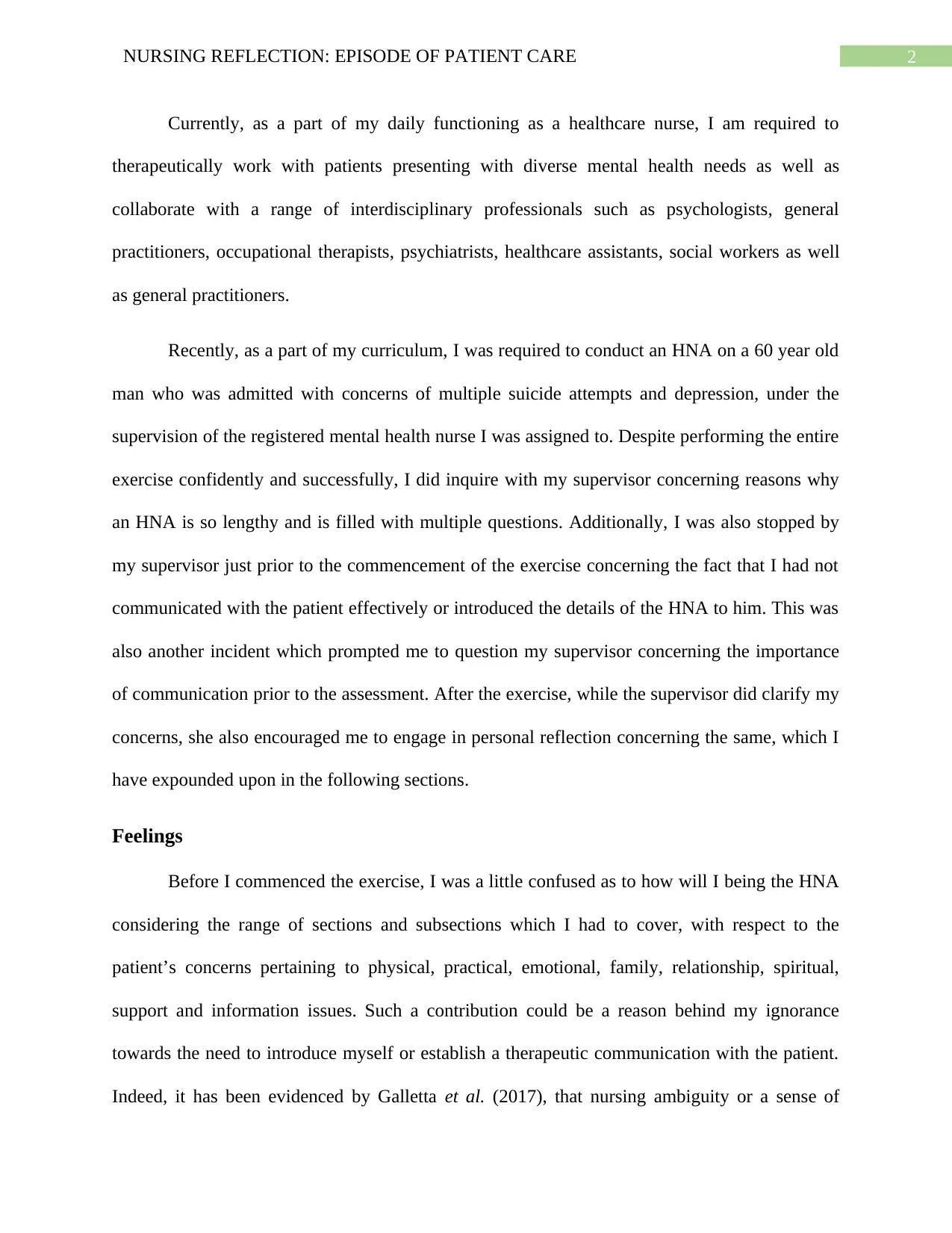
2NURSING REFLECTION: EPISODE OF PATIENT CARE
Currently, as a part of my daily functioning as a healthcare nurse, I am required to
therapeutically work with patients presenting with diverse mental health needs as well as
collaborate with a range of interdisciplinary professionals such as psychologists, general
practitioners, occupational therapists, psychiatrists, healthcare assistants, social workers as well
as general practitioners.
Recently, as a part of my curriculum, I was required to conduct an HNA on a 60 year old
man who was admitted with concerns of multiple suicide attempts and depression, under the
supervision of the registered mental health nurse I was assigned to. Despite performing the entire
exercise confidently and successfully, I did inquire with my supervisor concerning reasons why
an HNA is so lengthy and is filled with multiple questions. Additionally, I was also stopped by
my supervisor just prior to the commencement of the exercise concerning the fact that I had not
communicated with the patient effectively or introduced the details of the HNA to him. This was
also another incident which prompted me to question my supervisor concerning the importance
of communication prior to the assessment. After the exercise, while the supervisor did clarify my
concerns, she also encouraged me to engage in personal reflection concerning the same, which I
have expounded upon in the following sections.
Feelings
Before I commenced the exercise, I was a little confused as to how will I being the HNA
considering the range of sections and subsections which I had to cover, with respect to the
patient’s concerns pertaining to physical, practical, emotional, family, relationship, spiritual,
support and information issues. Such a contribution could be a reason behind my ignorance
towards the need to introduce myself or establish a therapeutic communication with the patient.
Indeed, it has been evidenced by Galletta et al. (2017), that nursing ambiguity or a sense of
Currently, as a part of my daily functioning as a healthcare nurse, I am required to
therapeutically work with patients presenting with diverse mental health needs as well as
collaborate with a range of interdisciplinary professionals such as psychologists, general
practitioners, occupational therapists, psychiatrists, healthcare assistants, social workers as well
as general practitioners.
Recently, as a part of my curriculum, I was required to conduct an HNA on a 60 year old
man who was admitted with concerns of multiple suicide attempts and depression, under the
supervision of the registered mental health nurse I was assigned to. Despite performing the entire
exercise confidently and successfully, I did inquire with my supervisor concerning reasons why
an HNA is so lengthy and is filled with multiple questions. Additionally, I was also stopped by
my supervisor just prior to the commencement of the exercise concerning the fact that I had not
communicated with the patient effectively or introduced the details of the HNA to him. This was
also another incident which prompted me to question my supervisor concerning the importance
of communication prior to the assessment. After the exercise, while the supervisor did clarify my
concerns, she also encouraged me to engage in personal reflection concerning the same, which I
have expounded upon in the following sections.
Feelings
Before I commenced the exercise, I was a little confused as to how will I being the HNA
considering the range of sections and subsections which I had to cover, with respect to the
patient’s concerns pertaining to physical, practical, emotional, family, relationship, spiritual,
support and information issues. Such a contribution could be a reason behind my ignorance
towards the need to introduce myself or establish a therapeutic communication with the patient.
Indeed, it has been evidenced by Galletta et al. (2017), that nursing ambiguity or a sense of
⊘ This is a preview!⊘
Do you want full access?
Subscribe today to unlock all pages.

Trusted by 1+ million students worldwide
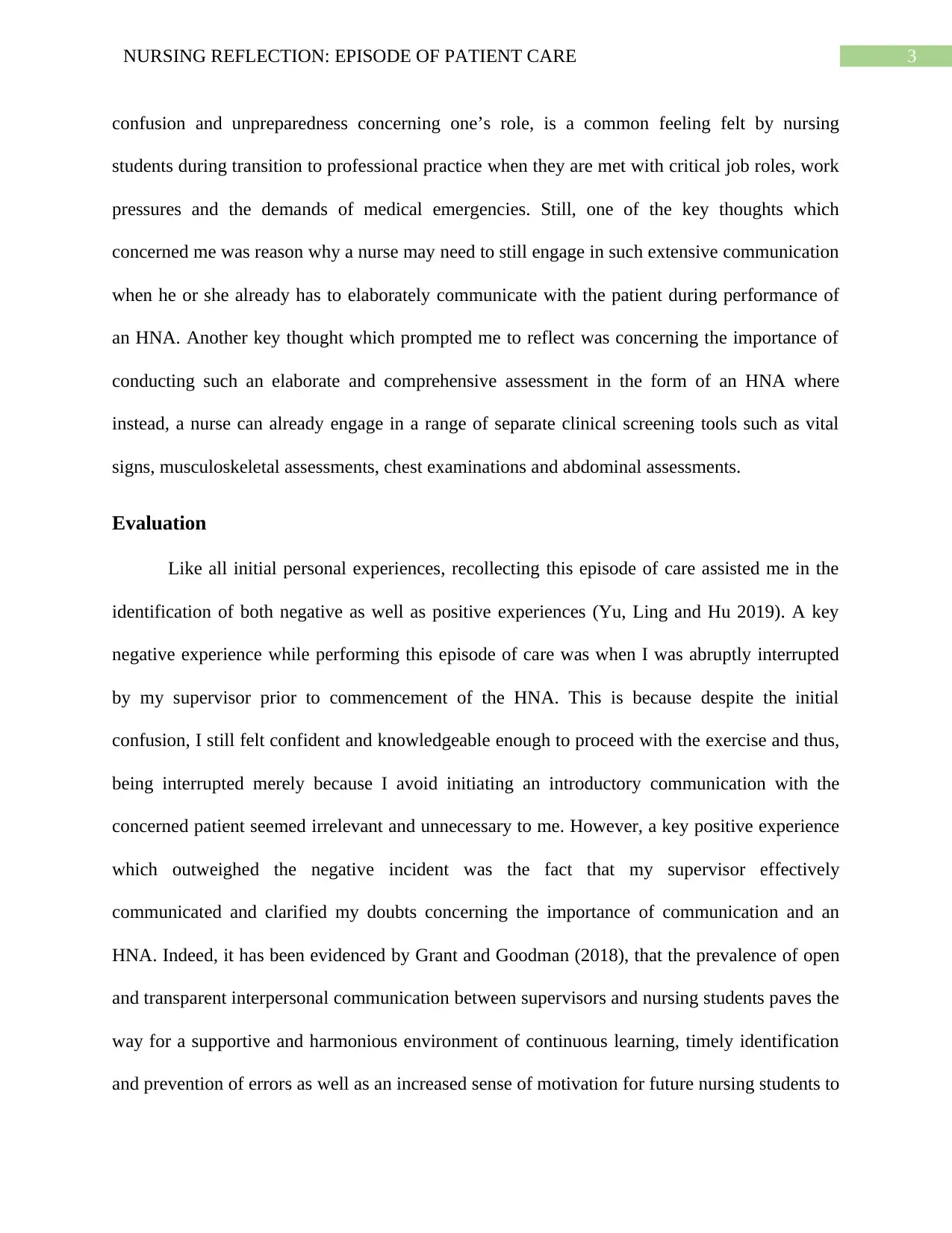
3NURSING REFLECTION: EPISODE OF PATIENT CARE
confusion and unpreparedness concerning one’s role, is a common feeling felt by nursing
students during transition to professional practice when they are met with critical job roles, work
pressures and the demands of medical emergencies. Still, one of the key thoughts which
concerned me was reason why a nurse may need to still engage in such extensive communication
when he or she already has to elaborately communicate with the patient during performance of
an HNA. Another key thought which prompted me to reflect was concerning the importance of
conducting such an elaborate and comprehensive assessment in the form of an HNA where
instead, a nurse can already engage in a range of separate clinical screening tools such as vital
signs, musculoskeletal assessments, chest examinations and abdominal assessments.
Evaluation
Like all initial personal experiences, recollecting this episode of care assisted me in the
identification of both negative as well as positive experiences (Yu, Ling and Hu 2019). A key
negative experience while performing this episode of care was when I was abruptly interrupted
by my supervisor prior to commencement of the HNA. This is because despite the initial
confusion, I still felt confident and knowledgeable enough to proceed with the exercise and thus,
being interrupted merely because I avoid initiating an introductory communication with the
concerned patient seemed irrelevant and unnecessary to me. However, a key positive experience
which outweighed the negative incident was the fact that my supervisor effectively
communicated and clarified my doubts concerning the importance of communication and an
HNA. Indeed, it has been evidenced by Grant and Goodman (2018), that the prevalence of open
and transparent interpersonal communication between supervisors and nursing students paves the
way for a supportive and harmonious environment of continuous learning, timely identification
and prevention of errors as well as an increased sense of motivation for future nursing students to
confusion and unpreparedness concerning one’s role, is a common feeling felt by nursing
students during transition to professional practice when they are met with critical job roles, work
pressures and the demands of medical emergencies. Still, one of the key thoughts which
concerned me was reason why a nurse may need to still engage in such extensive communication
when he or she already has to elaborately communicate with the patient during performance of
an HNA. Another key thought which prompted me to reflect was concerning the importance of
conducting such an elaborate and comprehensive assessment in the form of an HNA where
instead, a nurse can already engage in a range of separate clinical screening tools such as vital
signs, musculoskeletal assessments, chest examinations and abdominal assessments.
Evaluation
Like all initial personal experiences, recollecting this episode of care assisted me in the
identification of both negative as well as positive experiences (Yu, Ling and Hu 2019). A key
negative experience while performing this episode of care was when I was abruptly interrupted
by my supervisor prior to commencement of the HNA. This is because despite the initial
confusion, I still felt confident and knowledgeable enough to proceed with the exercise and thus,
being interrupted merely because I avoid initiating an introductory communication with the
concerned patient seemed irrelevant and unnecessary to me. However, a key positive experience
which outweighed the negative incident was the fact that my supervisor effectively
communicated and clarified my doubts concerning the importance of communication and an
HNA. Indeed, it has been evidenced by Grant and Goodman (2018), that the prevalence of open
and transparent interpersonal communication between supervisors and nursing students paves the
way for a supportive and harmonious environment of continuous learning, timely identification
and prevention of errors as well as an increased sense of motivation for future nursing students to
Paraphrase This Document
Need a fresh take? Get an instant paraphrase of this document with our AI Paraphraser
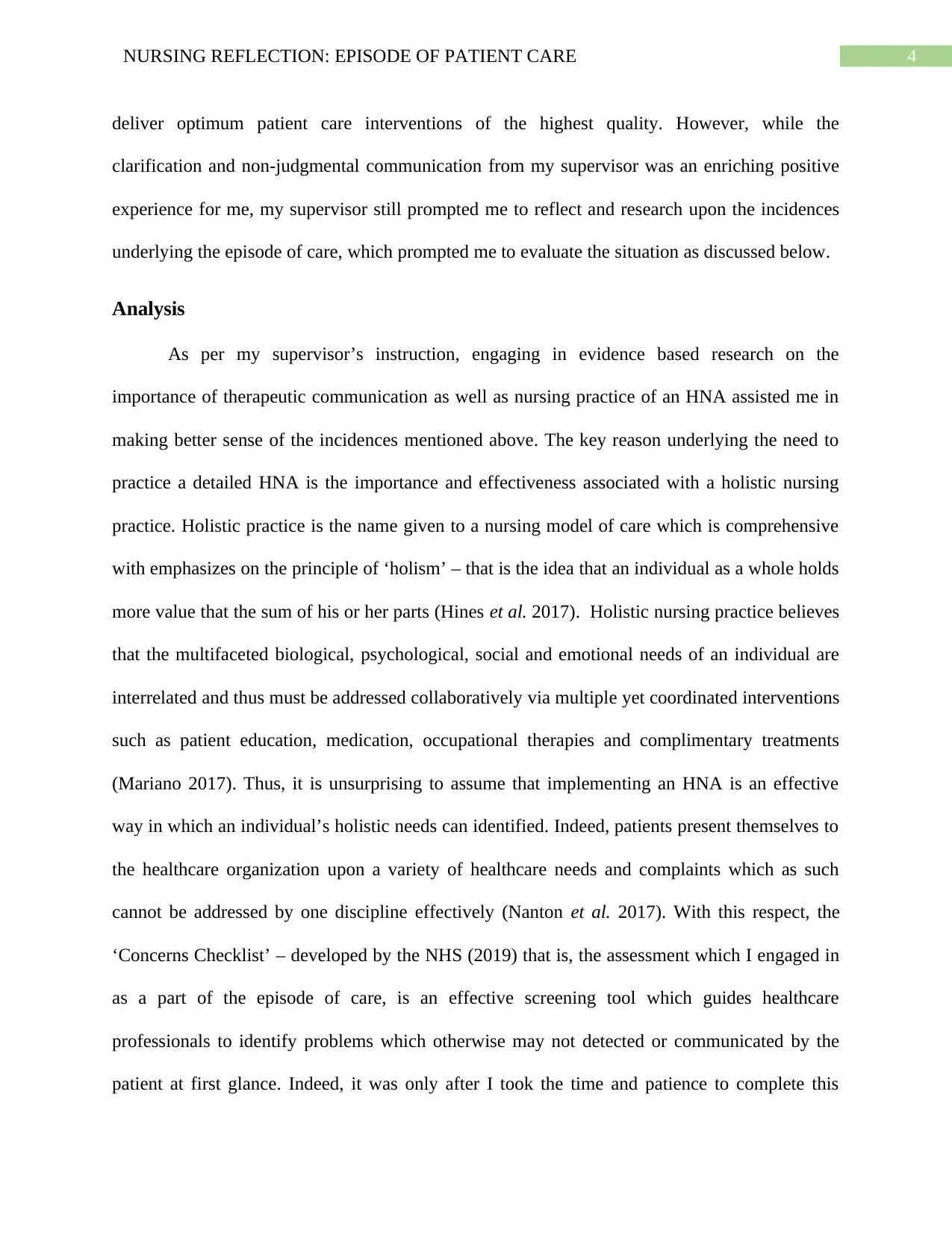
4NURSING REFLECTION: EPISODE OF PATIENT CARE
deliver optimum patient care interventions of the highest quality. However, while the
clarification and non-judgmental communication from my supervisor was an enriching positive
experience for me, my supervisor still prompted me to reflect and research upon the incidences
underlying the episode of care, which prompted me to evaluate the situation as discussed below.
Analysis
As per my supervisor’s instruction, engaging in evidence based research on the
importance of therapeutic communication as well as nursing practice of an HNA assisted me in
making better sense of the incidences mentioned above. The key reason underlying the need to
practice a detailed HNA is the importance and effectiveness associated with a holistic nursing
practice. Holistic practice is the name given to a nursing model of care which is comprehensive
with emphasizes on the principle of ‘holism’ – that is the idea that an individual as a whole holds
more value that the sum of his or her parts (Hines et al. 2017). Holistic nursing practice believes
that the multifaceted biological, psychological, social and emotional needs of an individual are
interrelated and thus must be addressed collaboratively via multiple yet coordinated interventions
such as patient education, medication, occupational therapies and complimentary treatments
(Mariano 2017). Thus, it is unsurprising to assume that implementing an HNA is an effective
way in which an individual’s holistic needs can identified. Indeed, patients present themselves to
the healthcare organization upon a variety of healthcare needs and complaints which as such
cannot be addressed by one discipline effectively (Nanton et al. 2017). With this respect, the
‘Concerns Checklist’ – developed by the NHS (2019) that is, the assessment which I engaged in
as a part of the episode of care, is an effective screening tool which guides healthcare
professionals to identify problems which otherwise may not detected or communicated by the
patient at first glance. Indeed, it was only after I took the time and patience to complete this
deliver optimum patient care interventions of the highest quality. However, while the
clarification and non-judgmental communication from my supervisor was an enriching positive
experience for me, my supervisor still prompted me to reflect and research upon the incidences
underlying the episode of care, which prompted me to evaluate the situation as discussed below.
Analysis
As per my supervisor’s instruction, engaging in evidence based research on the
importance of therapeutic communication as well as nursing practice of an HNA assisted me in
making better sense of the incidences mentioned above. The key reason underlying the need to
practice a detailed HNA is the importance and effectiveness associated with a holistic nursing
practice. Holistic practice is the name given to a nursing model of care which is comprehensive
with emphasizes on the principle of ‘holism’ – that is the idea that an individual as a whole holds
more value that the sum of his or her parts (Hines et al. 2017). Holistic nursing practice believes
that the multifaceted biological, psychological, social and emotional needs of an individual are
interrelated and thus must be addressed collaboratively via multiple yet coordinated interventions
such as patient education, medication, occupational therapies and complimentary treatments
(Mariano 2017). Thus, it is unsurprising to assume that implementing an HNA is an effective
way in which an individual’s holistic needs can identified. Indeed, patients present themselves to
the healthcare organization upon a variety of healthcare needs and complaints which as such
cannot be addressed by one discipline effectively (Nanton et al. 2017). With this respect, the
‘Concerns Checklist’ – developed by the NHS (2019) that is, the assessment which I engaged in
as a part of the episode of care, is an effective screening tool which guides healthcare
professionals to identify problems which otherwise may not detected or communicated by the
patient at first glance. Indeed, it was only after I took the time and patience to complete this
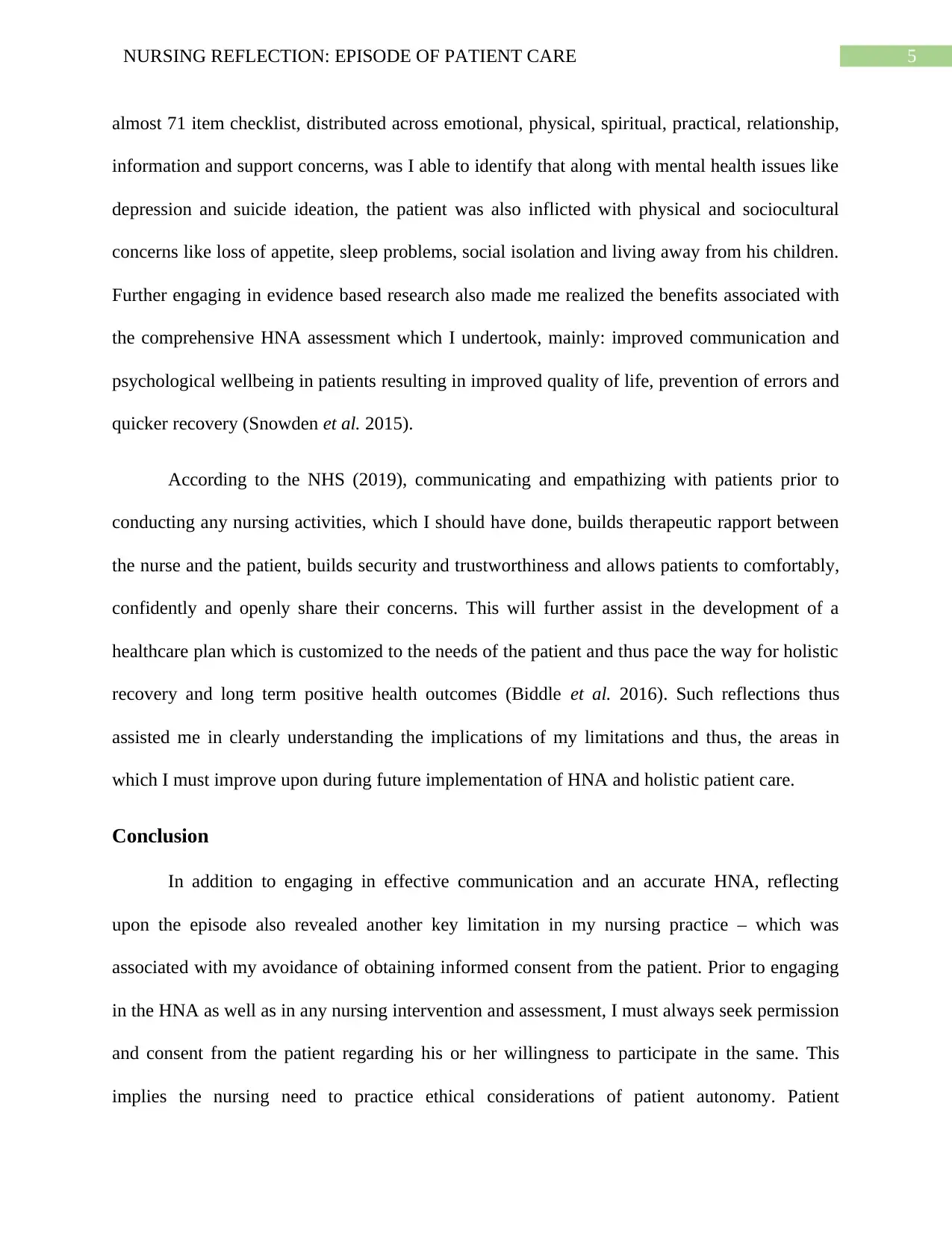
5NURSING REFLECTION: EPISODE OF PATIENT CARE
almost 71 item checklist, distributed across emotional, physical, spiritual, practical, relationship,
information and support concerns, was I able to identify that along with mental health issues like
depression and suicide ideation, the patient was also inflicted with physical and sociocultural
concerns like loss of appetite, sleep problems, social isolation and living away from his children.
Further engaging in evidence based research also made me realized the benefits associated with
the comprehensive HNA assessment which I undertook, mainly: improved communication and
psychological wellbeing in patients resulting in improved quality of life, prevention of errors and
quicker recovery (Snowden et al. 2015).
According to the NHS (2019), communicating and empathizing with patients prior to
conducting any nursing activities, which I should have done, builds therapeutic rapport between
the nurse and the patient, builds security and trustworthiness and allows patients to comfortably,
confidently and openly share their concerns. This will further assist in the development of a
healthcare plan which is customized to the needs of the patient and thus pace the way for holistic
recovery and long term positive health outcomes (Biddle et al. 2016). Such reflections thus
assisted me in clearly understanding the implications of my limitations and thus, the areas in
which I must improve upon during future implementation of HNA and holistic patient care.
Conclusion
In addition to engaging in effective communication and an accurate HNA, reflecting
upon the episode also revealed another key limitation in my nursing practice – which was
associated with my avoidance of obtaining informed consent from the patient. Prior to engaging
in the HNA as well as in any nursing intervention and assessment, I must always seek permission
and consent from the patient regarding his or her willingness to participate in the same. This
implies the nursing need to practice ethical considerations of patient autonomy. Patient
almost 71 item checklist, distributed across emotional, physical, spiritual, practical, relationship,
information and support concerns, was I able to identify that along with mental health issues like
depression and suicide ideation, the patient was also inflicted with physical and sociocultural
concerns like loss of appetite, sleep problems, social isolation and living away from his children.
Further engaging in evidence based research also made me realized the benefits associated with
the comprehensive HNA assessment which I undertook, mainly: improved communication and
psychological wellbeing in patients resulting in improved quality of life, prevention of errors and
quicker recovery (Snowden et al. 2015).
According to the NHS (2019), communicating and empathizing with patients prior to
conducting any nursing activities, which I should have done, builds therapeutic rapport between
the nurse and the patient, builds security and trustworthiness and allows patients to comfortably,
confidently and openly share their concerns. This will further assist in the development of a
healthcare plan which is customized to the needs of the patient and thus pace the way for holistic
recovery and long term positive health outcomes (Biddle et al. 2016). Such reflections thus
assisted me in clearly understanding the implications of my limitations and thus, the areas in
which I must improve upon during future implementation of HNA and holistic patient care.
Conclusion
In addition to engaging in effective communication and an accurate HNA, reflecting
upon the episode also revealed another key limitation in my nursing practice – which was
associated with my avoidance of obtaining informed consent from the patient. Prior to engaging
in the HNA as well as in any nursing intervention and assessment, I must always seek permission
and consent from the patient regarding his or her willingness to participate in the same. This
implies the nursing need to practice ethical considerations of patient autonomy. Patient
⊘ This is a preview!⊘
Do you want full access?
Subscribe today to unlock all pages.

Trusted by 1+ million students worldwide
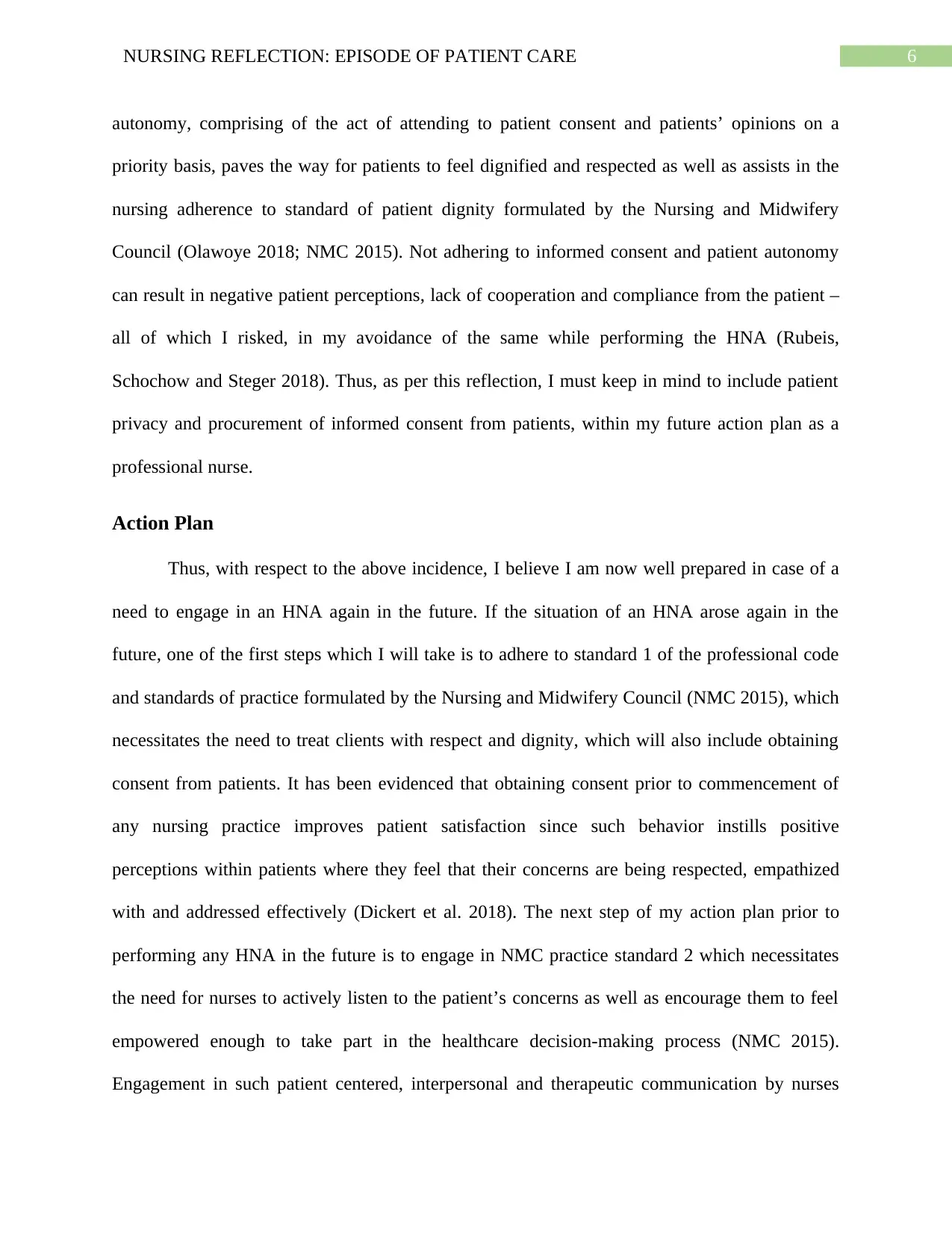
6NURSING REFLECTION: EPISODE OF PATIENT CARE
autonomy, comprising of the act of attending to patient consent and patients’ opinions on a
priority basis, paves the way for patients to feel dignified and respected as well as assists in the
nursing adherence to standard of patient dignity formulated by the Nursing and Midwifery
Council (Olawoye 2018; NMC 2015). Not adhering to informed consent and patient autonomy
can result in negative patient perceptions, lack of cooperation and compliance from the patient –
all of which I risked, in my avoidance of the same while performing the HNA (Rubeis,
Schochow and Steger 2018). Thus, as per this reflection, I must keep in mind to include patient
privacy and procurement of informed consent from patients, within my future action plan as a
professional nurse.
Action Plan
Thus, with respect to the above incidence, I believe I am now well prepared in case of a
need to engage in an HNA again in the future. If the situation of an HNA arose again in the
future, one of the first steps which I will take is to adhere to standard 1 of the professional code
and standards of practice formulated by the Nursing and Midwifery Council (NMC 2015), which
necessitates the need to treat clients with respect and dignity, which will also include obtaining
consent from patients. It has been evidenced that obtaining consent prior to commencement of
any nursing practice improves patient satisfaction since such behavior instills positive
perceptions within patients where they feel that their concerns are being respected, empathized
with and addressed effectively (Dickert et al. 2018). The next step of my action plan prior to
performing any HNA in the future is to engage in NMC practice standard 2 which necessitates
the need for nurses to actively listen to the patient’s concerns as well as encourage them to feel
empowered enough to take part in the healthcare decision-making process (NMC 2015).
Engagement in such patient centered, interpersonal and therapeutic communication by nurses
autonomy, comprising of the act of attending to patient consent and patients’ opinions on a
priority basis, paves the way for patients to feel dignified and respected as well as assists in the
nursing adherence to standard of patient dignity formulated by the Nursing and Midwifery
Council (Olawoye 2018; NMC 2015). Not adhering to informed consent and patient autonomy
can result in negative patient perceptions, lack of cooperation and compliance from the patient –
all of which I risked, in my avoidance of the same while performing the HNA (Rubeis,
Schochow and Steger 2018). Thus, as per this reflection, I must keep in mind to include patient
privacy and procurement of informed consent from patients, within my future action plan as a
professional nurse.
Action Plan
Thus, with respect to the above incidence, I believe I am now well prepared in case of a
need to engage in an HNA again in the future. If the situation of an HNA arose again in the
future, one of the first steps which I will take is to adhere to standard 1 of the professional code
and standards of practice formulated by the Nursing and Midwifery Council (NMC 2015), which
necessitates the need to treat clients with respect and dignity, which will also include obtaining
consent from patients. It has been evidenced that obtaining consent prior to commencement of
any nursing practice improves patient satisfaction since such behavior instills positive
perceptions within patients where they feel that their concerns are being respected, empathized
with and addressed effectively (Dickert et al. 2018). The next step of my action plan prior to
performing any HNA in the future is to engage in NMC practice standard 2 which necessitates
the need for nurses to actively listen to the patient’s concerns as well as encourage them to feel
empowered enough to take part in the healthcare decision-making process (NMC 2015).
Engagement in such patient centered, interpersonal and therapeutic communication by nurses
Paraphrase This Document
Need a fresh take? Get an instant paraphrase of this document with our AI Paraphraser
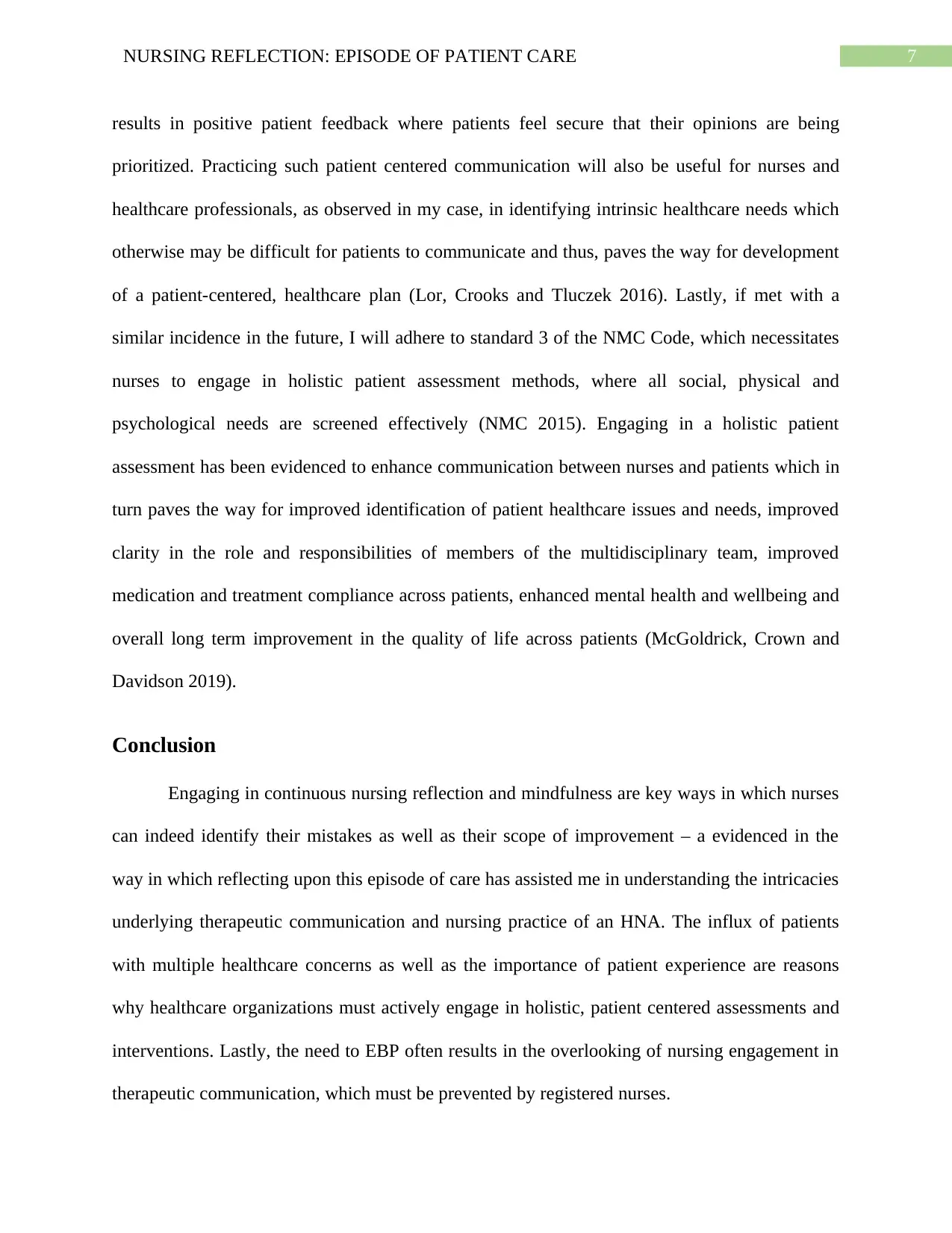
7NURSING REFLECTION: EPISODE OF PATIENT CARE
results in positive patient feedback where patients feel secure that their opinions are being
prioritized. Practicing such patient centered communication will also be useful for nurses and
healthcare professionals, as observed in my case, in identifying intrinsic healthcare needs which
otherwise may be difficult for patients to communicate and thus, paves the way for development
of a patient-centered, healthcare plan (Lor, Crooks and Tluczek 2016). Lastly, if met with a
similar incidence in the future, I will adhere to standard 3 of the NMC Code, which necessitates
nurses to engage in holistic patient assessment methods, where all social, physical and
psychological needs are screened effectively (NMC 2015). Engaging in a holistic patient
assessment has been evidenced to enhance communication between nurses and patients which in
turn paves the way for improved identification of patient healthcare issues and needs, improved
clarity in the role and responsibilities of members of the multidisciplinary team, improved
medication and treatment compliance across patients, enhanced mental health and wellbeing and
overall long term improvement in the quality of life across patients (McGoldrick, Crown and
Davidson 2019).
Conclusion
Engaging in continuous nursing reflection and mindfulness are key ways in which nurses
can indeed identify their mistakes as well as their scope of improvement – a evidenced in the
way in which reflecting upon this episode of care has assisted me in understanding the intricacies
underlying therapeutic communication and nursing practice of an HNA. The influx of patients
with multiple healthcare concerns as well as the importance of patient experience are reasons
why healthcare organizations must actively engage in holistic, patient centered assessments and
interventions. Lastly, the need to EBP often results in the overlooking of nursing engagement in
therapeutic communication, which must be prevented by registered nurses.
results in positive patient feedback where patients feel secure that their opinions are being
prioritized. Practicing such patient centered communication will also be useful for nurses and
healthcare professionals, as observed in my case, in identifying intrinsic healthcare needs which
otherwise may be difficult for patients to communicate and thus, paves the way for development
of a patient-centered, healthcare plan (Lor, Crooks and Tluczek 2016). Lastly, if met with a
similar incidence in the future, I will adhere to standard 3 of the NMC Code, which necessitates
nurses to engage in holistic patient assessment methods, where all social, physical and
psychological needs are screened effectively (NMC 2015). Engaging in a holistic patient
assessment has been evidenced to enhance communication between nurses and patients which in
turn paves the way for improved identification of patient healthcare issues and needs, improved
clarity in the role and responsibilities of members of the multidisciplinary team, improved
medication and treatment compliance across patients, enhanced mental health and wellbeing and
overall long term improvement in the quality of life across patients (McGoldrick, Crown and
Davidson 2019).
Conclusion
Engaging in continuous nursing reflection and mindfulness are key ways in which nurses
can indeed identify their mistakes as well as their scope of improvement – a evidenced in the
way in which reflecting upon this episode of care has assisted me in understanding the intricacies
underlying therapeutic communication and nursing practice of an HNA. The influx of patients
with multiple healthcare concerns as well as the importance of patient experience are reasons
why healthcare organizations must actively engage in holistic, patient centered assessments and
interventions. Lastly, the need to EBP often results in the overlooking of nursing engagement in
therapeutic communication, which must be prevented by registered nurses.
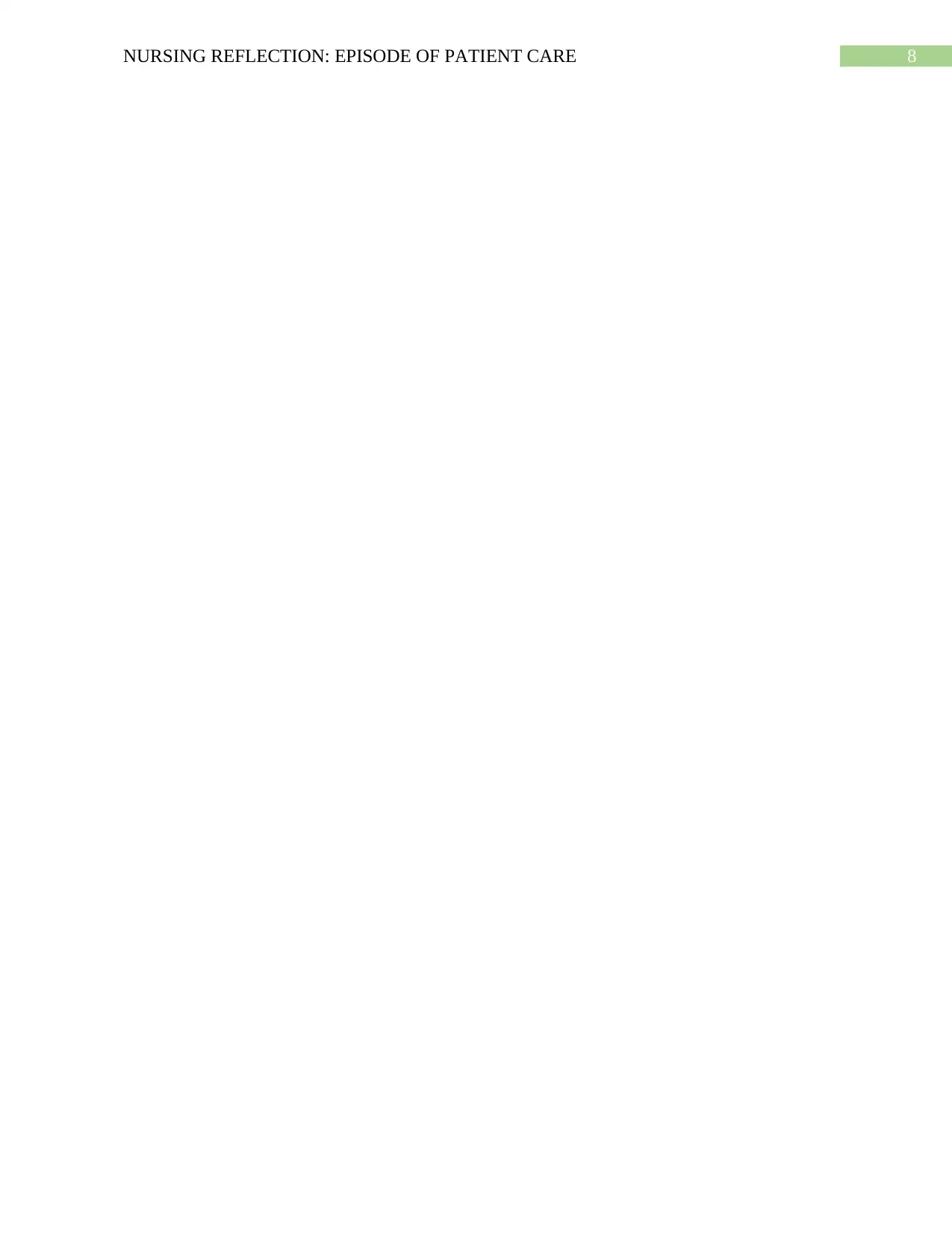
8NURSING REFLECTION: EPISODE OF PATIENT CARE
⊘ This is a preview!⊘
Do you want full access?
Subscribe today to unlock all pages.

Trusted by 1+ million students worldwide
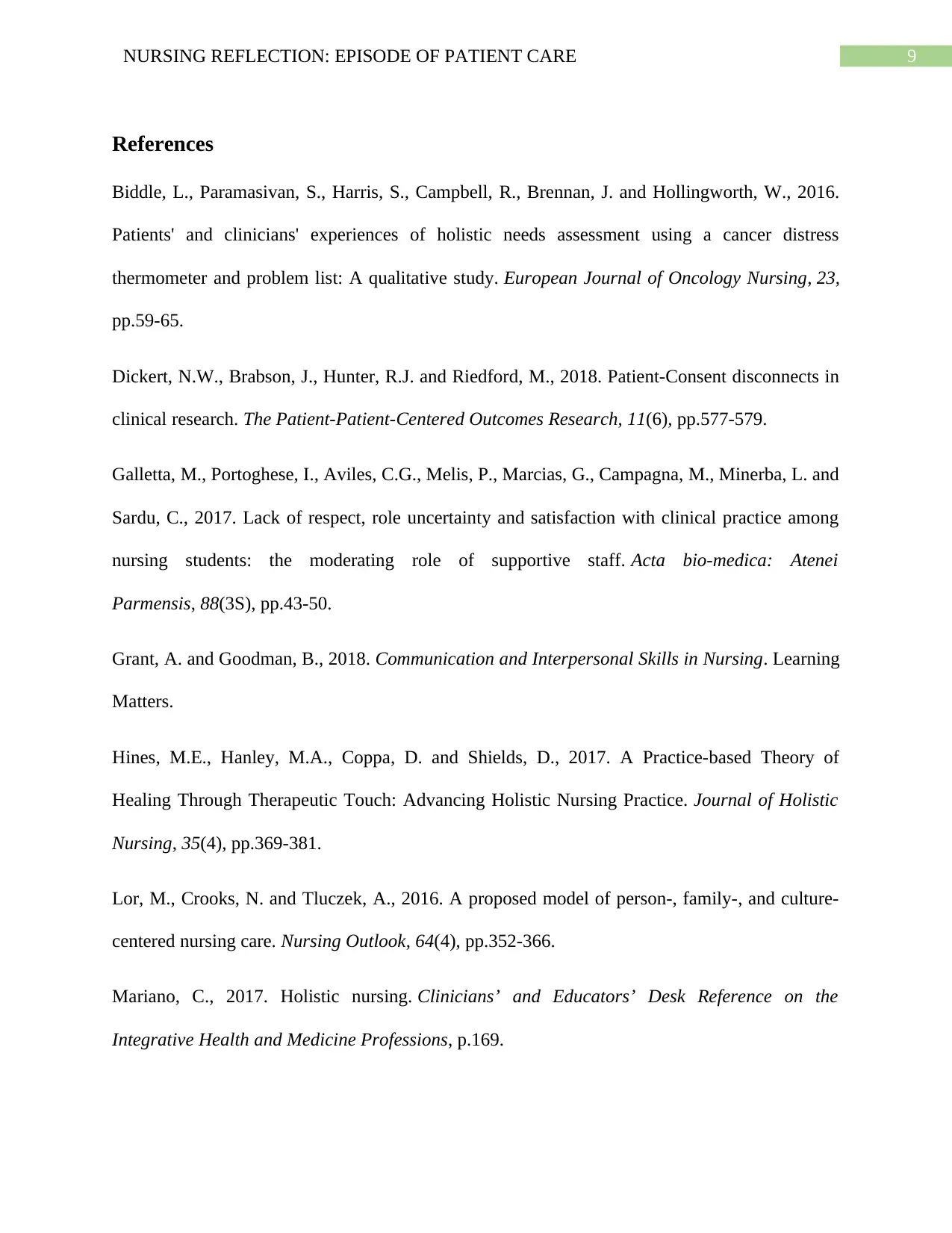
9NURSING REFLECTION: EPISODE OF PATIENT CARE
References
Biddle, L., Paramasivan, S., Harris, S., Campbell, R., Brennan, J. and Hollingworth, W., 2016.
Patients' and clinicians' experiences of holistic needs assessment using a cancer distress
thermometer and problem list: A qualitative study. European Journal of Oncology Nursing, 23,
pp.59-65.
Dickert, N.W., Brabson, J., Hunter, R.J. and Riedford, M., 2018. Patient-Consent disconnects in
clinical research. The Patient-Patient-Centered Outcomes Research, 11(6), pp.577-579.
Galletta, M., Portoghese, I., Aviles, C.G., Melis, P., Marcias, G., Campagna, M., Minerba, L. and
Sardu, C., 2017. Lack of respect, role uncertainty and satisfaction with clinical practice among
nursing students: the moderating role of supportive staff. Acta bio-medica: Atenei
Parmensis, 88(3S), pp.43-50.
Grant, A. and Goodman, B., 2018. Communication and Interpersonal Skills in Nursing. Learning
Matters.
Hines, M.E., Hanley, M.A., Coppa, D. and Shields, D., 2017. A Practice-based Theory of
Healing Through Therapeutic Touch: Advancing Holistic Nursing Practice. Journal of Holistic
Nursing, 35(4), pp.369-381.
Lor, M., Crooks, N. and Tluczek, A., 2016. A proposed model of person-, family-, and culture-
centered nursing care. Nursing Outlook, 64(4), pp.352-366.
Mariano, C., 2017. Holistic nursing. Clinicians’ and Educators’ Desk Reference on the
Integrative Health and Medicine Professions, p.169.
References
Biddle, L., Paramasivan, S., Harris, S., Campbell, R., Brennan, J. and Hollingworth, W., 2016.
Patients' and clinicians' experiences of holistic needs assessment using a cancer distress
thermometer and problem list: A qualitative study. European Journal of Oncology Nursing, 23,
pp.59-65.
Dickert, N.W., Brabson, J., Hunter, R.J. and Riedford, M., 2018. Patient-Consent disconnects in
clinical research. The Patient-Patient-Centered Outcomes Research, 11(6), pp.577-579.
Galletta, M., Portoghese, I., Aviles, C.G., Melis, P., Marcias, G., Campagna, M., Minerba, L. and
Sardu, C., 2017. Lack of respect, role uncertainty and satisfaction with clinical practice among
nursing students: the moderating role of supportive staff. Acta bio-medica: Atenei
Parmensis, 88(3S), pp.43-50.
Grant, A. and Goodman, B., 2018. Communication and Interpersonal Skills in Nursing. Learning
Matters.
Hines, M.E., Hanley, M.A., Coppa, D. and Shields, D., 2017. A Practice-based Theory of
Healing Through Therapeutic Touch: Advancing Holistic Nursing Practice. Journal of Holistic
Nursing, 35(4), pp.369-381.
Lor, M., Crooks, N. and Tluczek, A., 2016. A proposed model of person-, family-, and culture-
centered nursing care. Nursing Outlook, 64(4), pp.352-366.
Mariano, C., 2017. Holistic nursing. Clinicians’ and Educators’ Desk Reference on the
Integrative Health and Medicine Professions, p.169.
Paraphrase This Document
Need a fresh take? Get an instant paraphrase of this document with our AI Paraphraser
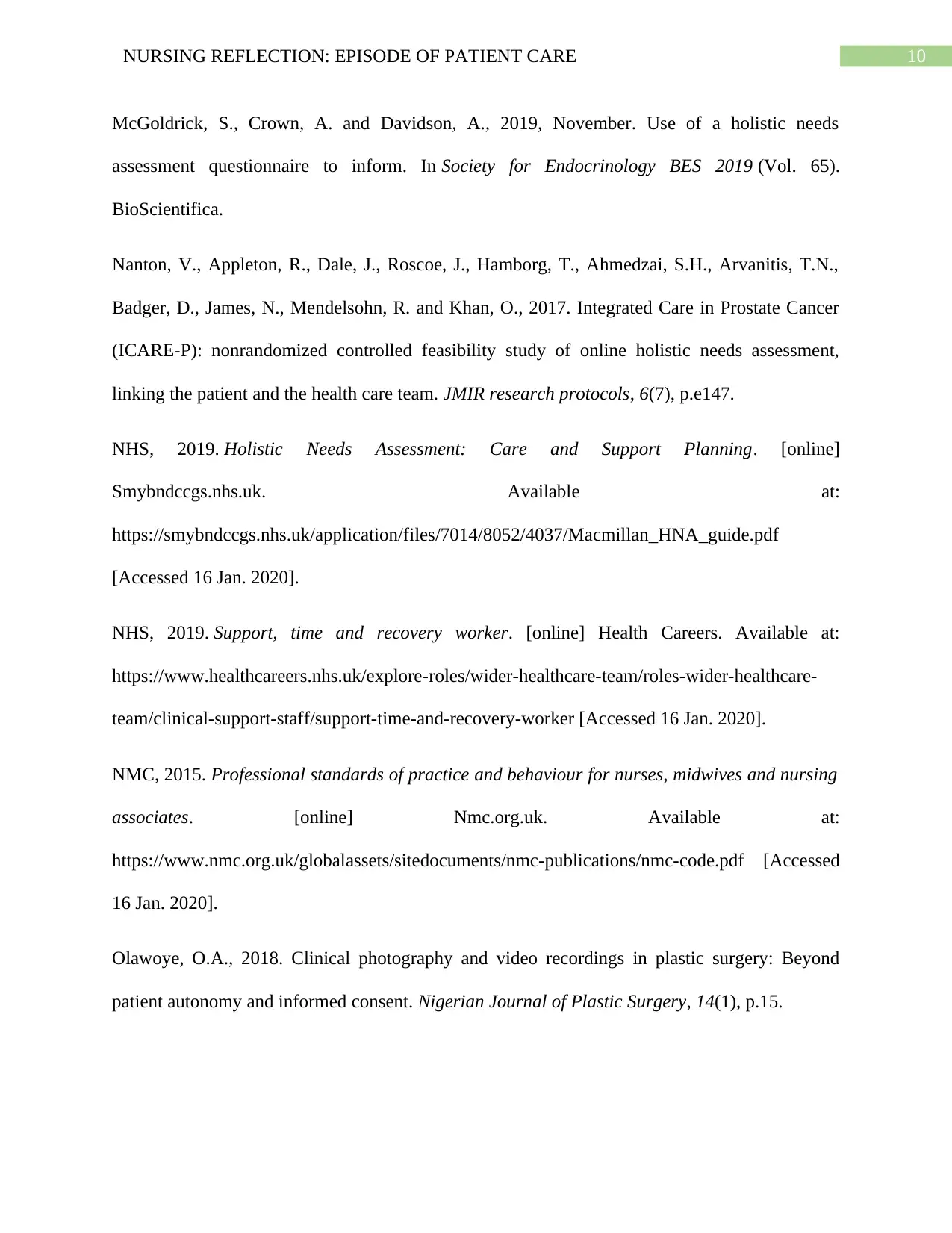
10NURSING REFLECTION: EPISODE OF PATIENT CARE
McGoldrick, S., Crown, A. and Davidson, A., 2019, November. Use of a holistic needs
assessment questionnaire to inform. In Society for Endocrinology BES 2019 (Vol. 65).
BioScientifica.
Nanton, V., Appleton, R., Dale, J., Roscoe, J., Hamborg, T., Ahmedzai, S.H., Arvanitis, T.N.,
Badger, D., James, N., Mendelsohn, R. and Khan, O., 2017. Integrated Care in Prostate Cancer
(ICARE-P): nonrandomized controlled feasibility study of online holistic needs assessment,
linking the patient and the health care team. JMIR research protocols, 6(7), p.e147.
NHS, 2019. Holistic Needs Assessment: Care and Support Planning. [online]
Smybndccgs.nhs.uk. Available at:
https://smybndccgs.nhs.uk/application/files/7014/8052/4037/Macmillan_HNA_guide.pdf
[Accessed 16 Jan. 2020].
NHS, 2019. Support, time and recovery worker. [online] Health Careers. Available at:
https://www.healthcareers.nhs.uk/explore-roles/wider-healthcare-team/roles-wider-healthcare-
team/clinical-support-staff/support-time-and-recovery-worker [Accessed 16 Jan. 2020].
NMC, 2015. Professional standards of practice and behaviour for nurses, midwives and nursing
associates. [online] Nmc.org.uk. Available at:
https://www.nmc.org.uk/globalassets/sitedocuments/nmc-publications/nmc-code.pdf [Accessed
16 Jan. 2020].
Olawoye, O.A., 2018. Clinical photography and video recordings in plastic surgery: Beyond
patient autonomy and informed consent. Nigerian Journal of Plastic Surgery, 14(1), p.15.
McGoldrick, S., Crown, A. and Davidson, A., 2019, November. Use of a holistic needs
assessment questionnaire to inform. In Society for Endocrinology BES 2019 (Vol. 65).
BioScientifica.
Nanton, V., Appleton, R., Dale, J., Roscoe, J., Hamborg, T., Ahmedzai, S.H., Arvanitis, T.N.,
Badger, D., James, N., Mendelsohn, R. and Khan, O., 2017. Integrated Care in Prostate Cancer
(ICARE-P): nonrandomized controlled feasibility study of online holistic needs assessment,
linking the patient and the health care team. JMIR research protocols, 6(7), p.e147.
NHS, 2019. Holistic Needs Assessment: Care and Support Planning. [online]
Smybndccgs.nhs.uk. Available at:
https://smybndccgs.nhs.uk/application/files/7014/8052/4037/Macmillan_HNA_guide.pdf
[Accessed 16 Jan. 2020].
NHS, 2019. Support, time and recovery worker. [online] Health Careers. Available at:
https://www.healthcareers.nhs.uk/explore-roles/wider-healthcare-team/roles-wider-healthcare-
team/clinical-support-staff/support-time-and-recovery-worker [Accessed 16 Jan. 2020].
NMC, 2015. Professional standards of practice and behaviour for nurses, midwives and nursing
associates. [online] Nmc.org.uk. Available at:
https://www.nmc.org.uk/globalassets/sitedocuments/nmc-publications/nmc-code.pdf [Accessed
16 Jan. 2020].
Olawoye, O.A., 2018. Clinical photography and video recordings in plastic surgery: Beyond
patient autonomy and informed consent. Nigerian Journal of Plastic Surgery, 14(1), p.15.
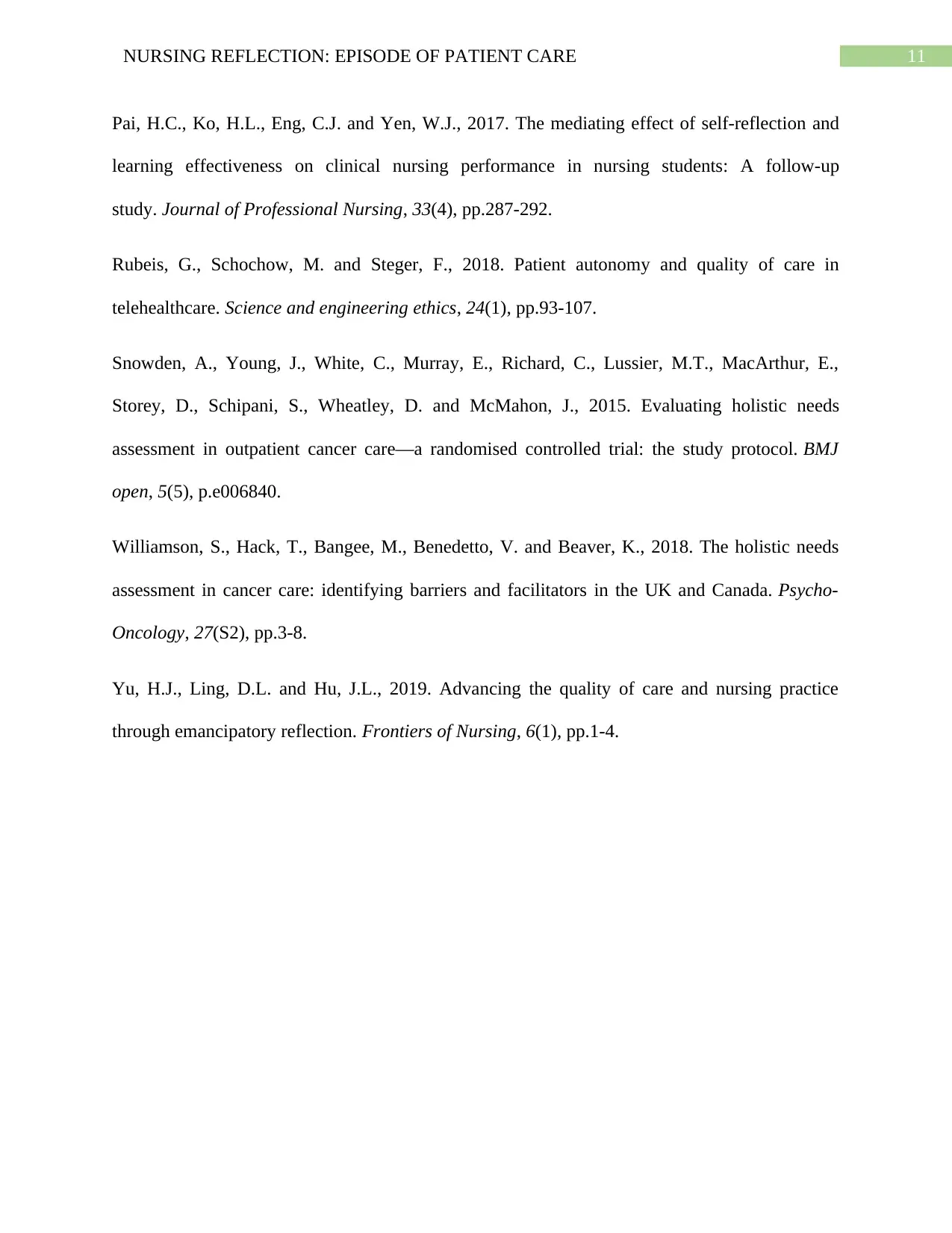
11NURSING REFLECTION: EPISODE OF PATIENT CARE
Pai, H.C., Ko, H.L., Eng, C.J. and Yen, W.J., 2017. The mediating effect of self-reflection and
learning effectiveness on clinical nursing performance in nursing students: A follow-up
study. Journal of Professional Nursing, 33(4), pp.287-292.
Rubeis, G., Schochow, M. and Steger, F., 2018. Patient autonomy and quality of care in
telehealthcare. Science and engineering ethics, 24(1), pp.93-107.
Snowden, A., Young, J., White, C., Murray, E., Richard, C., Lussier, M.T., MacArthur, E.,
Storey, D., Schipani, S., Wheatley, D. and McMahon, J., 2015. Evaluating holistic needs
assessment in outpatient cancer care—a randomised controlled trial: the study protocol. BMJ
open, 5(5), p.e006840.
Williamson, S., Hack, T., Bangee, M., Benedetto, V. and Beaver, K., 2018. The holistic needs
assessment in cancer care: identifying barriers and facilitators in the UK and Canada. Psycho-
Oncology, 27(S2), pp.3-8.
Yu, H.J., Ling, D.L. and Hu, J.L., 2019. Advancing the quality of care and nursing practice
through emancipatory reflection. Frontiers of Nursing, 6(1), pp.1-4.
Pai, H.C., Ko, H.L., Eng, C.J. and Yen, W.J., 2017. The mediating effect of self-reflection and
learning effectiveness on clinical nursing performance in nursing students: A follow-up
study. Journal of Professional Nursing, 33(4), pp.287-292.
Rubeis, G., Schochow, M. and Steger, F., 2018. Patient autonomy and quality of care in
telehealthcare. Science and engineering ethics, 24(1), pp.93-107.
Snowden, A., Young, J., White, C., Murray, E., Richard, C., Lussier, M.T., MacArthur, E.,
Storey, D., Schipani, S., Wheatley, D. and McMahon, J., 2015. Evaluating holistic needs
assessment in outpatient cancer care—a randomised controlled trial: the study protocol. BMJ
open, 5(5), p.e006840.
Williamson, S., Hack, T., Bangee, M., Benedetto, V. and Beaver, K., 2018. The holistic needs
assessment in cancer care: identifying barriers and facilitators in the UK and Canada. Psycho-
Oncology, 27(S2), pp.3-8.
Yu, H.J., Ling, D.L. and Hu, J.L., 2019. Advancing the quality of care and nursing practice
through emancipatory reflection. Frontiers of Nursing, 6(1), pp.1-4.
⊘ This is a preview!⊘
Do you want full access?
Subscribe today to unlock all pages.

Trusted by 1+ million students worldwide
1 out of 12
Related Documents
Your All-in-One AI-Powered Toolkit for Academic Success.
+13062052269
info@desklib.com
Available 24*7 on WhatsApp / Email
![[object Object]](/_next/static/media/star-bottom.7253800d.svg)
Unlock your academic potential
Copyright © 2020–2026 A2Z Services. All Rights Reserved. Developed and managed by ZUCOL.





